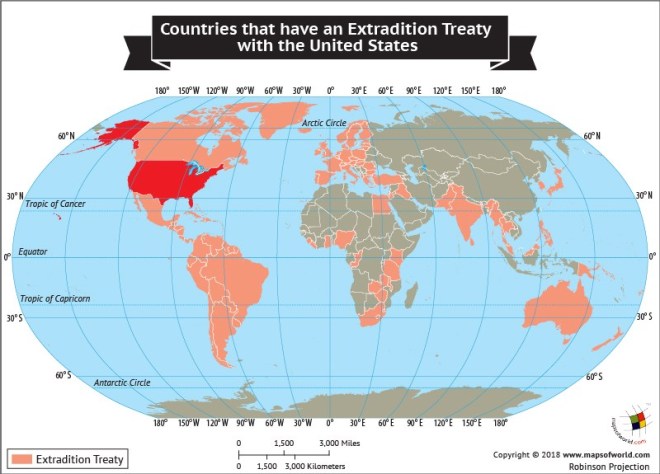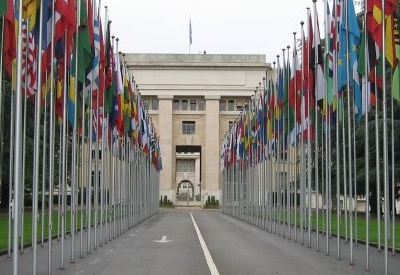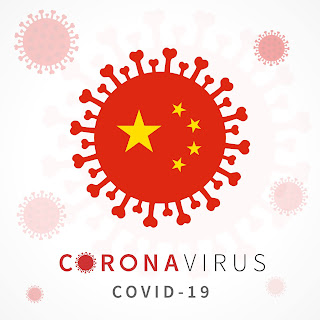The case of Meng Wanzhou, Huawei, and Canada
Canada has an extradition treaty with the United States that provides both countries with guarantees of bilateral communication regarding individuals who may pose a threat to the political system, and economic integrity of their respective nation-states, but also that may pose a threat to the international community. The Trump administration has looked at the history of the Huawei Corporation and how they do business and in particular, the CEO and daughter of the founder,Meng Wanzhou. She has been found guilty through American intelligence of co-opting with Iranian officials during a period when America has placed sanctions on Iran. American officials issued a warrant for her arrest based on these charges and issued a request through the Canadian security officials. Canadian officials arrested Meng in Vancouver. She is, basically, under house arrest in Vancouver and limited to a scope of travel around her residence with a security bracelet. Huawei has been linked to the People's Republic of China (PRC) and is considered a security risk. In the aftermath of the arrest by the Canadian officials, China has been extremely forceful in their demands for her release. Within one month of her arrest two Canadians, Michael Spavor and Michael Koveig were arrested in China and are being held to this point in time on charges of espionage that appear to be inter- related. They were in solitary confinement and now are being housed in a regular detention centre. Canadian Prime Minister Justin Trudeau has sought the help of U.S. President Donald Trump to mitigate a solution through the Chinese authorities, in particular, President Xi Jinping. At the recent G20 Summit in Tokyo, there was little to no explicit discussion regarding the release of these two Canadians, and their fate is tied to extradition proceedings against Meng Wanzghou and whether she will be exonerated or will be extradited to the United States to face these charges. In the meantime, Canada is bearing the brunt of these charges against her in trade and arbitrary detentions of these two Canadians. The Canadian Prime Minister has not exercised any strength in this matter and he will have to provide a more robust approach to dealing with China, despite China's economic might as the second strongest economy in the world and remodelled military. The question seems to be whether Canada should return this woman to Chinese officials and avoid the extradition process, or continue on this way in a major struggle with Chinese officials. In order to broaden Canada's influence in the international community the Prime Minister now has to stay the course and allow the legal proceedings to play out despite the loss of beef, chicken, and canola exports to China. Not to mention innocent lives that are being held arbitrarily on charges that are unrelated. Conversely, Canada can simply return her to China and ask for forgiveness and the return of Canadian exports to their typical levels, and the release of the Canadian hostages. The situation has gone too far forward to simply release Meng with the hopes of returning Canadian – Chinese relations to the level they were prior to Meng's arrest.
The United States Department of Justice lists the following criterion for extradition. Canadian authorities acted in a fairly robust manner. Initially, a New York court issued a warrant for Meng's arrest on August 22, 2018. On December 1 2018 Canadian authorities arrested Meng at Vancouver airport as she was en route to Mexico. On December 8 China's Le Yucheng issued this statement: “China strongly urges the Canadian side to immediately release the detained Huawei executive … or face grave consequences that the Canadian side should be held accountable for.”1
On December 10, Chinese authorities arrested Canadians, Michael Spavor and Michael Kovrig. Initially, they were held in solitary confinement, and formally charged with espionage in May 2019. Recently, Chinese officials seized Kovrig's reading glasses.
Amartya Sen,a long time Harvard professor, ( 1998 Nobel Peace Prize for Economics,) indicated that the most crucial event of the 20th century was the emergence of democracy as a global ideology. China has found economic democratisation fulfilling to a point, yet remains mired in authoritarian dogma as the case of Meng illustrates, and their pettiness towards Canada for her arrest. Perhaps China and Meng will be vindicated if this case goes to trial in the U.S.and she is exonerated from these charges. But, what if she is found guilty and ordered to face a penalty? Will China tamp down their rhetoric and bullying, particularly of Canada, or will Xi and Chinese authorities increase the vitriol and behave in an indignant manner, that indicate to all that authoritarianism is indeed, alive and well in China.
China has a great opportunity to embrace the spectre of democracy and develop their "soft power" as America and others have done. That development reinforces democracy and expounds economic matters. Should China turn further inward, the National Peoples Congress may well want to reconsider re-imposing term limits on the presidency. Moreover, international law has expanded vigorously between 1951 and 1995 with 3,666 new multilateral treaties completed including the Vienna Convention, law of the sea, and intellectual property laws, among others.2
The Central Government would do well to adopt these traits or risk the ire of the international community, that has little appetite for oppressive regimes. China can survive politically, but must adapt or risk a further increase in cases of civil disobedience that have fractured Hong Kong, recently. According to a report in The Economist, 180,000 incidents of civil disobedience were likely in 2010. The PRC has stopped keeping records.
August 22 2019: U.S. Secretary of State, Mike Pompeo met with Canadian Prime Minister, Justin Trudeau in Ottawa. Pompeo assured Trudeau that American officials including Pres. Trump have spoken with Chinese officials about the release of Michael Spavor and Michael Kovrig. Canadian officials refuse to release Meng to Chinese officials, which, ultimately, is the main stumbling block to resolution of this crisis. Moreover, the Canadian Consulate in Hong Kong has just announced that it has suspended travel to mainland China for local staff related to the detainment of a British consular staff member from the Hong Kong office, as reported by Reuters on August 23, 2019.
Therefore:
1) is this an issue in the upcoming Canadian election?
Yes, because China has linked trade issues and arbitrary detentions to Meng's arrest and release.
2) will Canadian officials capitulate to Chinese demands and release Meng.
No. The Canadian government has been found culpable in the SNC Lavalin case in Canada and cannot appear even slightly bypassing Canadian legal protocols, particularly, with the federal election looming in October. The upcoming election is a tight race and a minority government is all but assured. A comprehensive poll by the CBC released on August 21, 2019: Conservatives 33.9; Liberals 32.6.
3) can Canadian officials pressure Chinese officials using Canadian means to release the two detained men?
Yes and No. Canada can engage in FONOPS in the South China Sea and Taiwan Strait, with allies. Canada can also place tariffs on Chinese goods and file a formal issue with the World Trade Organization over unfair trade practises that are linked to Meng. Moreover, Canada can draw closer ties to Taiwan in diplomacy i.e. Canada has a trade office in Taipei, though, not a formal embassy. Ultimately, the trade - offs for the detained mens release will create further problems with Canada - U.S. relations as China will surely demand the return of Meng as any precondition. The U.S. is Canada's largest trading partner with U.S. exports totalling $360. 5 BIL in 2018 compared to Canadian imports totalling 353.6 BIL for a trade surplus with Canada of 7 BIL in 2018.4
Below is the criterion from the U.S. Department of Justice regarding the provisions for extradition requests.
9-15.230 - Request for Provisional Arrest
Every extradition treaty to which the United States is a party requires a formal request for extradition, supported by appropriate documents. Because the time involved in preparing a formal request can be lengthy, most treaties allow for the provisional arrest of fugitives in urgent cases. Once the United States requests provisional arrest pursuant to the treaty, the fugitive may be arrested and detained (or, in some countries, released on bail) following the issuance of an order of arrest by the foreign authorities. Thereafter, the United States must submit a formal request for extradition, supported by all necessary documents, duly certified, authenticated and, if necessary, translated into the language of the country where the fugitive was arrested, within a specified time (from 30 days to three months, depending on the treaty). See JM 9-15.240. Failure to follow through on an extradition request by submitting the requisite documents after a provisional arrest has been made will result in release of the fugitive, strains on diplomatic relations, and possible liability for the prosecutor.
The Criminal Division’s Office of International Affairs (OIA) determines whether the facts of the case meet the requirement of urgency under the terms of the applicable treaty. If they do, OIA requests provisional arrest; if not, the prosecutor assembles the documents for a formal request for extradition. The latter method is favored when the defendant is unlikely to flee because the time pressures generated by a request for provisional arrest may result in errors that can damage the case. If provisional arrest is necessary because of the risk of flight, the prosecutor should complete the form for requesting provisional arrest and forward it, along with a copy of the charging document and arrest warrant, to OIA by email. State prosecutors who request provisional arrest must also certify that they will submit the necessary documents on time and will cover all expenses, including the costs of translation and transportation by U. S. Marshals.
Prosecutors should complete a form requesting provisional arrest (available from OIA) in any case in which it appears that provisional arrest may be necessary. Once it is completed, it may be emailed directly to the OIA attorney or team responsible for the country in which the fugitive has been found or is believed to be located. A copy of the charging document, arrest warrant, and any other necessary documents to support the provisional arrest request to that country should be forwarded to OIA.
The form was created with both federal and state cases in mind. Thus, Assistant United States Attorneys are free to share the form with state and local prosecutors working on extradition cases. State prosecutors should email it to the OIA attorney who covers the relevant country. 3
Works Cited
1 The Canadian Press. "Timeline: Here’s how the case of Huawei CFO Meng Wanzhou unfolded." 6 March 2019. 5 July 2019. <https://globalnews.ca/news/5029136/huawei-meng-wanzhou-canada-timeline/>.
2 Margaret P. Karns and Karen A. Mingst. International Organizations: The Politics and Processes of Global Governance. Rienner: Boulder. 2004. 6 July 2019. 5.
3 The United States Department of Justice. "International Extradition and Related Matters." 2018 April (updated.) 6 July 2019. <https://www.justice.gov/jm/jm-9-15000-international-extradition-and-related-matters>.
2 Margaret P. Karns and Karen A. Mingst. International Organizations: The Politics and Processes of Global Governance. Rienner: Boulder. 2004. 6 July 2019. 5.
3 The United States Department of Justice. "International Extradition and Related Matters." 2018 April (updated.) 6 July 2019. <https://www.justice.gov/jm/jm-9-15000-international-extradition-and-related-matters>.
4 Office of the United States Trade Representative. 22 August 2019. <https://ustr.gov/countries






